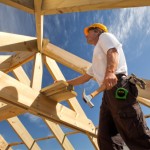Confidence remains high in the UK building industry remains high despite the number of newly registered homes falling, the Brexit vote and a downturn in London. According to annual data from the National House Building Council, new home registrations – which provide an indicator of future completions – fell 2.5% in 2016 to 151,687. Mike Quinton, […]
 Confidence remains high in the UK building industry remains high despite the number of newly registered homes falling, the Brexit vote and a downturn in London.
Confidence remains high in the UK building industry remains high despite the number of newly registered homes falling, the Brexit vote and a downturn in London.
According to annual data from the National House Building Council, new home registrations – which provide an indicator of future completions – fell 2.5% in 2016 to 151,687.
Mike Quinton, NHBC chief executive, said: “Taking into account the extraordinary events of 2016, the UK house-building sector has remained resilient, despite initial caution around Brexit. We have also seen some strong regional growth outside of London.
“Both industry and consumer confidence remains high and early signs indicate that the new year has begun positively.”
The NHBC is a warranty and insurance provider that covers around 80% of the UK building market.
The number of new homes completed during 2016 was 141,175, marginally up 1% on 2015’s total of 140,407.
However, the number of new home registrations fell from 25,760 to 17,322 in London, driven by stamp duty increases and the Brexit vote.
Excluding London, it was the highest new home registrations since 2007.
NHBC’s latest data also revealed that seven out of 12 regions experienced an increase in registrations, most notably Yorkshire & Humberside (+27%), South East (+14%) and North West (+12%), compared to 2015 figures.
Separate figures from IHS Markit revealed that in January there was a slowdown in construction sector growth.
The Markit/CIPS UK Construction Purchasing Managers’ Index registered 52.2 in January, down from 54.2 in December.
This signalled the weakest rise in overall business activity since the post-referendum recovery began in September last year. All three sub-sectors – housing, commercial and civil engineering – recorded softer rates of output growth in January.
Housebuilding growth slowed to a five-month low in January and was lacklustre, although it remained the growing part of the construction sector.
Corry Bourke, director at residential development finance provider Urban Exposure, said: “Construction activity is showing signs of a slowdown following the post referendum recovery. Since September, construction activity has remained relatively strong despite the strong headwinds following the referendum result.
“However, we must remain cautious and remember that we haven’t even started the process of ‘Brexiting’ yet and therefore there are still many unknowns that are likely to impact confidence and put a halt to new projects. This slowdown in growth may be a reflection of building uncertainty in the lead up to triggering Article 50. In addition, the falling pound is continuing to put pressure on the industry, driving up costs for construction firms which heavily rely on cheap imports.
“The good news is that construction companies continue to remain positive about future growth opportunities. Indeed, we believe that once some certainty returns to the market, construction activity will be boosted even further.”














